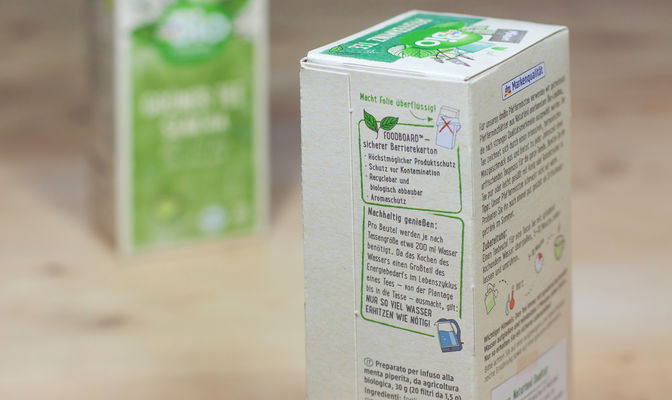EFSA Opinion on Mineral Oil Migration FOODBOARD™ ensures comprehensive protection
01.10.2012 - FOODBOARD™, Barriers
The European Food Safety Authority (EFSA) recently published a scientific opinion entitled ‘Scientific Opinion on Mineral Oil Hydrocarbons in Food’ that deals with dietary exposure to mineral oil hydrocarbons (MOH) found in food.
The 185-page EFSA report outlines numerous sources for the presence of mineral oils in food. Sources of MOH in food are additives, processing aids and lubricants that are used in food production. Food packaging materials and environmental contaminants can also be sources of MOH. Examples include mineral oils used as additives in the manufacture of plastics, adhesives, wax paper and cartonboard, jute and sisal bags with mineral batching oil, lubricants for tin can manufacture, materials made from recycled paper, corrugated board packaging and recycled cartonboard packaging without an internal barrier, printing inks applied to paper and cartonboard and environmental contamination sources.
Higher levels of exposure among younger consumers
Dietary exposure to MOH varies within age classes. It is therefore difficult to assess the health effects of exposure, however, levels of exposure are higher among young people as opposed to adults or the elderly. Groups of consumers that often purchase the same contaminated foodstuffs are exposed to an increased risk of consuming more MOAH.
Lack of knowledge concerning MOAH
The EFSA concludes that the available toxicological and analytical data is not sufficient to prove the toxic impact of mineral oil traces on the human body but made it clear that the issue is of concern and will remain so until verified studies identify no specific food safety concerns. The position of the EFSA therefore corresponds to that of the German Ministry of Food, Agriculture and Consumer Protection (BMELV).
EFSA’s opinion also makes a series of recommendations for improving methods of analysis, data collection and monitoring as well as indications for possible future priorities of scientific research on MOH. An improvement of the analytical methods would allow separation of MOSH (saturated hydrocarbons) and MOAH (aromatic hydrocarbons) into subclasses. The discussed detection limit should also be examined.
FOODBOARDTM ready to come into effect before mineral oil regulation
The current EFSA statement and the last draft of the BMELV’s ‘Mineral Oil Regulation’ (‘22nd Regulation amending the Consumer Goods Safety Regulation’) clearly show that mineral oil migration can only be fully stopped by including a functional barrier in the primary packaging. This solution also offers protection against migration from secondary (corrugated) packaging during storage and transport – a process referred to as cross contamination.
Mayr-Melnhof Karton takes the migration of mineral oils into foodstuffs very seriously. The use of FOODBOARD™ provides the necessary protection and ensures the safety of packaged food. Given the length of the legal process, FOODBOARDTM will be available before the mineral oil regulation comes into effect.
If you are interested in FOODBOARD™ or have further questions, please contact our team of experts at FOODBOARD@mm-karton.com.

Interested? Datasheet and Samples of
FOODBOARD™ can be found here:
PRODUCT CATALOGUE

![[Translate to English:] [Translate to English:]](/fileadmin/_processed_/9/4/csm_4_Gewinner_7ba52790a9.jpg)
